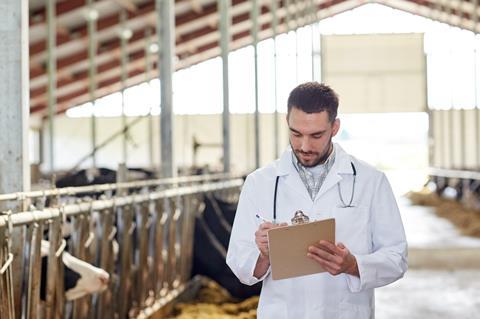The Association of Independent Meat Suppliers (AIMS) has said it “strongly disagrees” with recent claims from the Food Standards Agency (FSA) and Food Standards Scotland (FSS).

The statement from AIMS comes as FSA and FSS published the ‘Our Food 2023’ report, which detailed how industry needed to ensure “adequate supply and availability of official veterinarians to uphold food safety and animal health and welfare standards”.
In the report, FSA and FSS said: “Official veterinarian capacity is critical to the operation of the food supply chain and our export capability. Without a reliable and secure resourcing model, there is increased risk of disruption to the UK meat chain in the years ahead due to staff shortages, as well as increasing costs that will be passed on to businesses and consumers.”
They went on to say: “It is vital that we find a practical, affordable long-term solution that allows us to continue accessing and training an adequate supply of vets to maintain staffing levels. It is also inevitable that costs will rise given the salary increases required to recruit and retain vets.
“To ensure the UK public continues to have food they can trust now and into the future, we will need legislative change, financial support, a robust recruitment pipeline and a joined-up approach across Government, industry and the veterinary profession.”
“Suggesting that standards would fall without vets onsite is inaccurate and ignores the role of modern technology and business-led safety measures.”
Jason Aldiss, AIMS head of external affairs.

Jason Aldiss, head of external affairs at AIMS, said: “We feel that this is both misleading and ignores the legal responsibility that food business operators (FBOs) have for food safety.
“In its early years FSA was committed to adopting a risk-based approach to meat regulation, but since it took over delivery of meat official controls it has become entirely risk-averse, focusing on unnecessary veterinary oversight rather than trusting FBOs to meet their legal duties. The law is clear: FBOs are responsible for food safety. Veterinarians are only required to verify that FBOs are doing what they say they are doing, not to manage their processes.”
AIMS highlighted that the UK’s meat industry is recognised for its “high standards, driven by the expertise of the businesses themselves”.
Aldiss continued: “Suggesting that standards would fall without vets onsite is inaccurate and ignores the role of modern technology and business-led safety measures.
“Full-time veterinary presence adds costs without improving food safety and distracts from real innovations like blockchain and AI, which can provide more effective oversight.
“AIMS are now calling for a move away from outdated, costly veterinary controls and toward smarter, technology-driven solutions to uphold the UK’s world-leading standards.”
“We need to work in partnership to deliver the food system that consumers want and need in the future.”
Professor Susan Jebb, FSA chair
Professor Susan Jebb, chair of the FSA, said that the “rising cost-of-living and inflation” had continued to impact consumer grocery bills, with food businesses “grappling with labour shortages and increased supply chain costs”.
Jebb said: “Despite these pressures, our food standards remain high and there is much to be celebrated in the resilience of the UK’s food system.
“I remain concerned however about the ongoing shortages in the key professionals we need to keep our food safe. Our report also highlights the need for public health policies across the UK that address the causes of poor diets.
“No single organisation or Government can ensure that all consumers have equitable access to safe, healthy and sustainable food, and we need to work in partnership to deliver the food system that consumers want and need in the future.”















